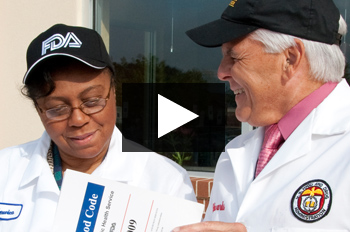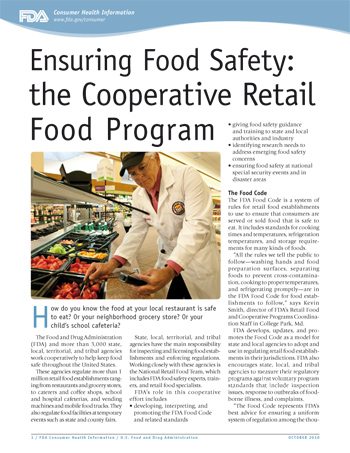For Consumers
Ensuring Food Safety: The Cooperative Retail Food Program
View the photo slideshow  |
 Get Consumer Updates by E-mail
Get Consumer Updates by E-mail
On this page
How do you know the food at your local restaurant is safe to eat? Or your neighborhood grocery store? Or your child’s school cafeteria?
The Food and Drug Administration (FDA) and more than 3,000 state, local, territorial, and tribal agencies work cooperatively to help keep retail food safe throughout the United States.
These agencies regulate more than 1 million retail food establishments ranging from restaurants and grocery stores, to caterers and coffee shops, school and hospital cafeterias, and vending machines and mobile food trucks. They also regulate food facilities at temporary events such as state and county fairs.
State, local, territorial, and tribal agencies have the main responsibility for inspecting and licensing food establishments and enforcing regulations. Working closely with these agencies is the National Retail Food Team, which includes FDA food safety experts, trainers, and retail food specialists.
FDA’s role in this cooperative effort includes
- developing, interpreting, and promoting the FDA Food Code and related standards
- giving food safety guidance and training to state and local authorities and industry
- identifying research needs to address emerging food safety concerns
- ensuring food safety at national special security events and in disaster areas
The Food Code
The FDA Food Code is a system of safeguards for retail food establishments to use to ensure that consumers are served or sold food that is safe to eat. It includes standards for cooking times and temperatures, refrigeration temperatures, and storage requirements for many kinds of foods.
“All the rules we tell the public to follow—washing hands and food preparation surfaces, separating foods to prevent cross-contamination, cooking to proper temperatures, and refrigerating promptly—are in the FDA Food Code for food establishments to follow,” says Kevin Smith, director of FDA’s Retail Food and Cooperative Programs Coordination Staff in College Park, Md.
FDA develops, updates, and promotes the Food Code as a model for state and local agencies to adopt and use in regulating retail food establishments in their jurisdictions.
“The Food Code represents FDA’s best advice for ensuring a uniform system of regulation among the thousands of federal, state, and local agencies and tribes that are responsible for retail food safety,” says Capt. Cynthia Kunkel, M.P.H., an FDA regional food specialist based in Lenexa, Kan.
Guidance and Training
While state and local agencies have the authority to pass or fail a restaurant after inspection, remove unsafe products from store shelves, and arrest and fine violators, FDA provides the guidance and training they need to protect food in their jurisdictions.
“Training is a big part of the retail food specialist’s job,” says Kunkel. FDA’s two dozen retail food specialists work within five geographic regions covering the entire United States, with each specialist responsible for a group of states in that region.
A key part of the process is a combination of training and “standardization.” Standardization is a field exercise that involves six to eight inspections with a standard and a candidate. If the candidate successfully completes the exercise, he or she becomes certified as an FDA Standardized Food Safety Inspection Officer.
At FDA’s Center for Food Safety and Applied Nutrition in College Park, Md., a standardizing official tests agency retail food specialists. Once qualified, these specialists return home to standardize state officials, who, in turn, standardize county and local inspectors.
Any retail establishment with a kitchen may be subject to an inspection by a Standardized Food Safety Inspection Officer. FDA retail food specialist Larry Edwards in Falls Church, Va., standardized the officer who works in the U.S. Capitol in Washington, D.C., inspecting the many kitchens that serve Congress, its employees, and the millions of people who visit this federal building.
“Whether the kitchens serve pizza, fast foods, or sit-down dinners for Congress—they are all inspected by people standardized by FDA,” says Edwards.
In addition to training, FDA offers help to state and local agencies. In the summer of 2009, FDA collaborated with the Illinois Department of Public Health to curb an outbreak of hepatitis A. This liver-damaging viral infection can be spread by consuming food or drinks handled by an infected person.
In this case, two infected employees at a fast food restaurant in Milan, Ill., handled food served to the public. The infection spread to 34 other people, including 14 who needed to be hospitalized.
Jayne Nosari, a food program manager in the Illinois Department of Public Health, says FDA helped guide the state on hepatitis A control measures during the outbreak and provided a six-step disinfection process designed for hepatitis A virus cleaning and sanitizing.
The state and county health departments then worked together to carry out the disinfection, allowing the restaurant to reopen after a three-day closure.
Research
FDA’s food safety experts identify research needed to address emerging food safety concerns, and often work cooperatively with other federal agencies to conduct the research.
For example, FDA is working with the U.S. Department of Agriculture to study practices for cooling foods in school cafeterias and to develop educational materials that highlight the most effective methods. “Without rapid cooling, bacteria can grow in foods and cause foodborne illness,” says FDA’s Smith.
National Special Security Events
FDA is called upon to help ensure that safe food is served at special events held in the United States, such as meetings of world powers, U.S.-based Olympic Games, political conventions, and inauguration activities.
FDA provided food safety and defense support to the caterers and hotels involved in events surrounding the inauguration of President Barack Obama in 2009. FDA retail food specialists and consumer safety officers teamed up to cover 16 events—luncheons, candlelight dinners, and balls—where 84,000 meals were served.
Greg Abel, an FDA retail food specialist in Minneapolis, says FDA specialists observed the caterers as they prepared, cooked, and cooled the food served at those events. They also collected meals at random and ran them through a lab analysis, which provided further protection against foodborne illnesses.
This article appears on FDA's Consumer Updates page, which features the latest on all FDA-regulated products.
Posted: October 22, 2010
For More Information
FoodSafety.gov: Your Gateway to Federal Food Safety Information Federal/State Food Programs Bad Bug Book 2nd Edition Retail Food Risk Factor Studies FDA Report on the Occurrence of Foodborne Illness Risk Factors in Selected Institutional Foodservice, Restaurant, and Retail Food Store Facility Types (2009) FDA Trend Analysis Report on the Occurrence of Foodborne Illness Risk Factors in Selected Institutional Foodservice, Restaurant, and Retail Food Store Facility Types (1998-2008) Safe Food Handling: What You Need to Know Food Irradiation: What You Need to Know FDA Food Code










